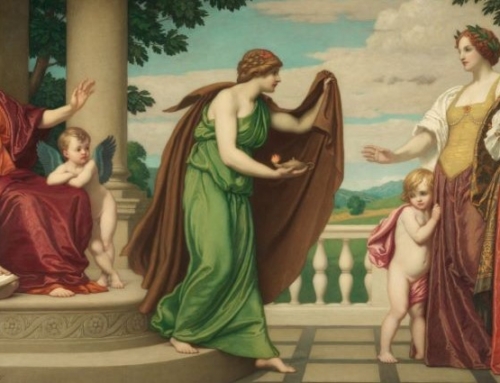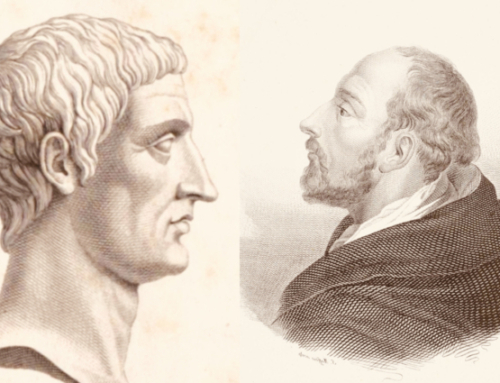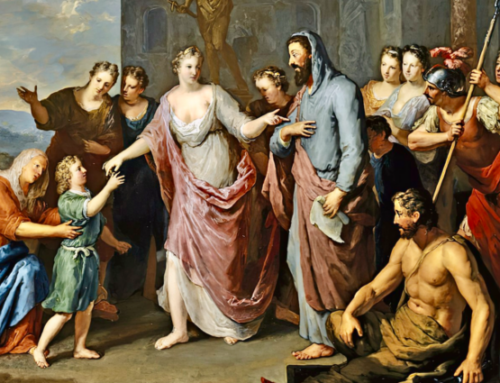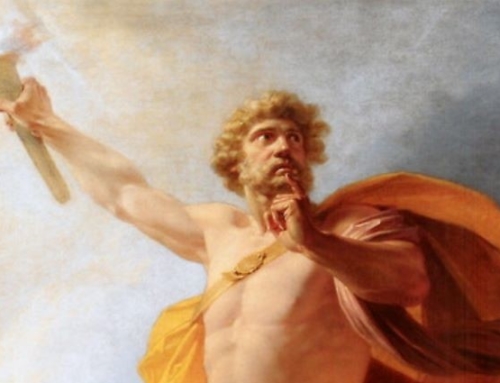In the 1984 film “The Karate Kid,” Mr. Miyagi’s teaching method may seem scandalous to Western eyes: Either Daniel does things his way, or not at all. The wise mentor refuses to reveal to Daniel the reason for his menial exercises. But it is precisely the virtue of submission and obedience that is essential for the student’s growth.
 Robert Mark Kamen’s classic 1984 film The Karate Kid has been told again and again through sequels and remakes to this day. It has all the elements of the heroic myth: a young boy, a wise mentor, a villain, a damsel in distress, culminating in nothing less than a battle between good and evil. The archetypal wise mentor is no stranger to classic cinema, but Mr. Miyagi in particular is worth some attention. In this essay I hope to argue exactly why and how Mr. Miyagi is the ideal teacher, and how in this capacity the modern West can learn from the East.
Robert Mark Kamen’s classic 1984 film The Karate Kid has been told again and again through sequels and remakes to this day. It has all the elements of the heroic myth: a young boy, a wise mentor, a villain, a damsel in distress, culminating in nothing less than a battle between good and evil. The archetypal wise mentor is no stranger to classic cinema, but Mr. Miyagi in particular is worth some attention. In this essay I hope to argue exactly why and how Mr. Miyagi is the ideal teacher, and how in this capacity the modern West can learn from the East.
The original story follows the disaffected teenager Daniel LaRusso as he struggles to fend off neighborhood bullies in his new hometown of Los Angeles. Daniel finds unexpected friendship in the next-door neighbor and handyman, an Okinawan immigrant named Mr. Miyagi. Upon Daniel’s repeated entreaties, Mr. Miyagi agrees to teach Daniel karate—on one curious condition. “We make sacred pact,” Miyagi tells Daniel in broken English. “I promise teach karate to you, you promise learn. I say, you do, no questions.”
Motivated primarily to rid himself of the humiliation of being bullied, Daniel eagerly agrees to this arrangement. But he is quickly thrown into confusion when he discovers that Mr. Miyagi’s first lesson is nothing more than waxing a car. “Wax on, wax off,” Mr. Miyagi instructs Daniel in the movie’s most memorable scene. After waxing his car, scrubbing his floor, and painting Mr. Miyagi’s fence and house, Daniel concludes in an angry outburst that Mr. Miyagi is taking advantage of him and making him into nothing more than a slave. But Mr. Miyagi is unrelenting. Either Daniel does things his way, or not at all.
What exactly was Miyagi’s aim in doing this, other than providing some comic entertainment value to the audience? As the story develops, Mr. Miyagi eventually makes his philosophy clear, although he arrives at the conclusion obliquely. Miyagi will not bestow upon Daniel the formidable power of vanquishing his enemies until he first understands the virtue of submission and obedience. Contrary to Daniel’s arrogant demands, Mr. Miyagi does not “owe him an explanation.” He does not even say, “learn to do this, and I will explain the reason later.” His only injunction is, “I say, you do, no questions… Wax on, wax off.”
The relationship that Mr. Miyagi establishes with Daniel is inherently Confucian in essence. Although Miyagi is Japanese, he mentions in one scene that karate had its origins in China. Daniel naively replies, “I thought it came from Buddhist temples and stuff like that.” Miyagi grunts, “you too much TV.” The humorous exchange draws an important distinction. The underlying philosophy of karate is not Buddhist, which postulates that desire is inherently corrupt and must be eliminated through self-denial. (St. Augustine shared this premise when he diagnosed the root of man’s sin as a corrupted will.) Unlike Buddhism, the Confucian ethos claims that the corrupted will is not cured by elimination per se but by establishing the proper hierarchy in social relationships. True teaching is predicated on trust in the teacher. How total is this trust? By Confucian standards, absolute.
To Western eyes, Mr. Miyagi’s teaching method may seem scandalous—even by so-called classical Socratic standards. Is it not one of the great values of Western education to encourage questions? The popular idea in the West (supposedly inherited from the democratic ideal) suggests that challenging authority is essential for growth. God forbid (or perhaps, Rousseau forbid) that children obey their parents because they are parents. For Americans, nothing is more undesirable and dangerous than the idea of “blind obedience.” Such thinking, we argue, leads to totalitarian, Orwellian dictatorship. English boarding schools of the Victorian era have become the popular scapegoat for lambasting authority-based discipleship, and for good reason. But by our new “enlightened” standards, teachers (and parents) must never use their authority as grounds for obedience at all. The stern mother who insists her children obey her with the sharp retort, “because I said so,” is now seen as a bad mother. Instead, we are encouraged (even obligated) to explain each and every reason in meticulous detail. If, after all our cajoling, the student is still unwilling to cooperate, we must “leave them to make their own decisions”—after all, we are Americans and authority is derived from the consent of the governed!
As C.S. Lewis pointed out in The Abolition of Man (Lord Acton’s insights notwithstanding), corruption is not necessarily inherent in the structure of a top-down, hierarchical authority. Rather, the roots of the state’s corruption are to be found in the widespread abandonment of the Tao. Without the Tao—the moral order—a bottom-up authority is no better than a top-down one. Teachers in American public schools often set up elaborate systems to keep their students from cheating. But even by merely practical, pragmatic standards, teaching students to be moral citizens would be far more effective in preventing cheating than any rule, however strictly enforced. Ultimately, the best form of government is the rule of the conscience.
“But,” the interlocutor may object, “if the best form of government is the rule of the conscience, would it not stand that the end goal of education is autonomy, not authority?” Indeed, autonomy is the end goal. But how are we to cultivate the conscience without authority? How can the student be good if he does not will the Good? This shift in conscience cannot be achieved without the exercise of authority in alignment with the Good.
Mr. Miyagi’s teaching method is a far cry from returning to English boarding schools. He does not wish for the breaking of the student’s will but for the surrender of it. To return to the thinking of Augustine, if the problem lies in a corrupted will, there is a sense in which the will must die. But Mr. Miyagi does not ultimately aim to annihilate the will but to redeem it. His message to Daniel is, in so many words, “give me your will, and I will show you how to use it properly.”
Mr. Miyagi does eventually reveal to Daniel the reason for every one of his menial exercises. Daniel was learning, although he did not know it, the “grammar” of karate. Through the repeated actions, Daniel had been unconsciously learning defensive blocks through muscle memory. But for Daniel, this method of education resulted not only in the discipline of the body, but the discipline of the mind and heart. Like all good teachers, Mr. Miyagi truly wishes Daniel to become his equal and even to exceed him in ability. But he does not wish that he should gain that ability outside of the teacher-student relation—indeed the skill cannot ultimately be stripped of the relationship at all. In some sense the skill is the relationship. As the son of a single mother living in Los Angeles, proper relationships are precisely what Daniel is missing in his life.
The Japanese musician, philosopher, and educator Shinichi Suzuki was famous for developing the world-renowned Suzuki method in musical education. Suzuki’s work and the measurable results it has produced provides evidence that Mr. Miyagi’s teaching philosophy is more than just a romanticized ideal. Suzuki’s motto was “character first, ability second,” and he presented the ideal pedagogical relationship as a “three-legged” stool between the parent, teacher, and student. It is no coincidence that this ideal relationship is identical in function with the nuclear family. This overlay between proper pedagogy and the family model is portrayed in The Karate Kid. When Daniel asks Mr. Miyagi where he received his training (perhaps expecting the name of some famous school), Miyagi simply replies, “Father teach.” It is also in this way that the portrait of Mr. Miyagi is a representation of the Confucian tradition, which holds that the family unit is the basis for the integrity of the whole society.
There is a low-resolution caricature between Eastern and Western tradition which depicts a false dichotomy between Confucian and Socratic teaching. Confucian teaching is supposedly traditional and authoritative, while Socratic teaching thrives on revolution and innovation. This caricature is based on the uniquely American misconception that Socratic discussion and dialogue questions everything. But it is not true that Socrates questioned everything, and he certainly did not encourage his students to question everything. Our modern education system, which does question everything (except the sacrosanct orthodoxy of political correctness), bears more likeness to the Athenian Sophists than to the Socratic ideal. Socrates detested the Sophists for their flippancy and disregard for the truth. While Socrates and Confucius may have differed superficially in methodology, their end goal was the same: to bring the student to the realization that he knows nothing so that he might voluntarily surrender his will in service of the Good in order to learn.
One can hardly avoid quoting the great Danish philosopher Søren Kierkegaard on this issue in his essay “On the Difference between a Genius and an Apostle”:
If a son were to say, ‘I obey my father, not because he is my father but because he is a genius, or because his orders are always profoundly intelligent,’ then that filial obedience is affected. The son accentuates something entirely wrong, he emphasizes the intellectual aspect, the profundity in a command, whereas a command is, of course, indifferent to that qualification. The son wishes to obey by virtue of the father’s intellectual profundity; and to obey by virtue thereof is just what is not possible, for his critical attitude as to whether the command is profound undermines the obedience.
Kierkegaard concludes,
The whole of modern philosophy is therefore affected, because it has done away with obedience on the one hand, and authority on the other, and then, in spite of everything, claims to be orthodox.
Obedience and authority may seem like old-fashioned ideals. The positive virtue of “obedience” has been substituted for the negative term “subservience,” and the positive virtue of “authority” has been substituted for “authoritarianism.” Even those who value obedience struggle to articulate what true obedience and just authority might look like. We may grant that Mr. Miyagi represents the ideal teacher, but there is little hope of implementing his methods on a large scale in the American public education system, unless we are prepared for an onslaught of lawsuits from angry parents. (Mr. Miyagi let Daniel drive without a license!) Education, even when helmed by people with the best intentions at heart, must operate under the understanding that any educational system can only be successful insofar as it participates with or at least simulates the family structure. To this end we must dispose of the egalitarian anthropology and return to a socio-relational dynamic. Let us put away the dream of making great geniuses of the next generation and return to the basics: “wax on, wax off.”
The Imaginative Conservative applies the principle of appreciation to the discussion of culture and politics—we approach dialogue with magnanimity rather than with mere civility. Will you help us remain a refreshing oasis in the increasingly contentious arena of modern discourse? Please consider donating now.
The featured image is a still from The Karate Kid (1984), featuring Ralph Macchio and Pat Morita, and appears here courtesy of IMDb.







Yes–we have for far too long neglected the virtue of obedience. “He who does not learn to obey will never be able to command.” Eugen Rosenstock-Huessy
This also follows the centurions words to Jesus: I too am a man under authority.